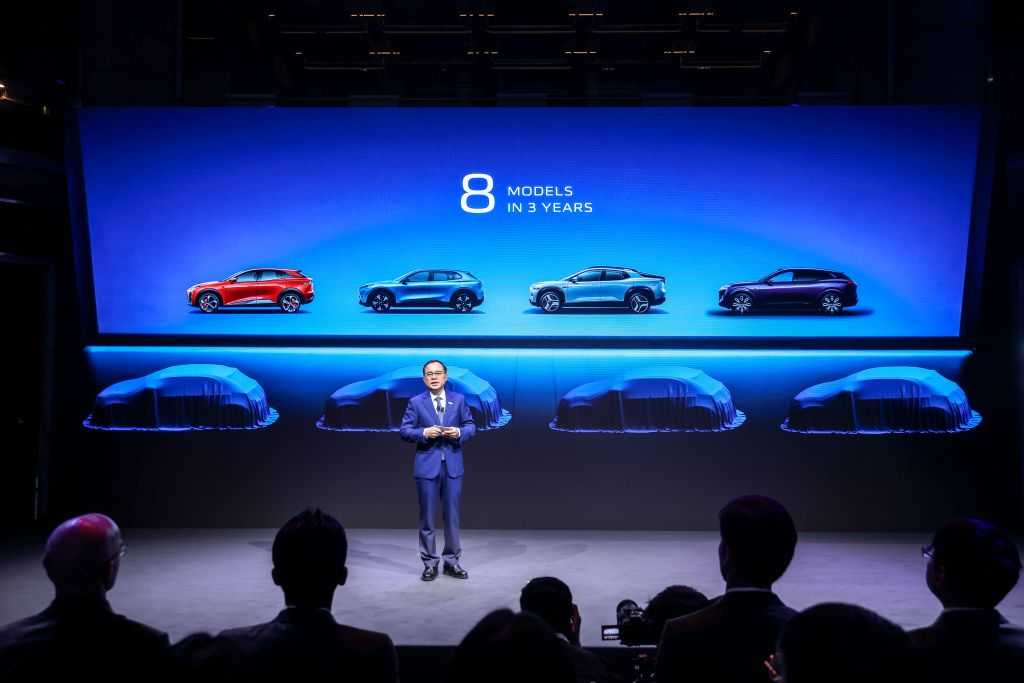Changan? There were actually colleagues who didn’t know the brand – in China it’s well-known: By 2024 it has produced around 1.6 million cars and, with its sub-brands Deepl and Avatr, represents a somewhat nonchalant state-owned corporation with a European flair in northeastern China. Since 2001, it has had a large design center in Turin with over 500 employees, and another in China with 900 employees. This is huge, and twice employees have explained to us that they are now able to push a vehicle through the entire design process within six months. In Europe, this can take up to two years, Claas Connor, Head of Design „Advanced,“ calculates for us, who was significantly involved in the Changan E07 – a hatchback electric car with a pickup rear.
In China, Changan is one of the big players
Briefly for context: Changan has been building cars for over 40 years, employs more than 82,000 people, and has put more than 26 million cars on the road to date. There are research centers in Nottingham, Chongqing, and Turin, and in China, it is the partner of Ford and Mazda – the new Mada 6e is built on a Changan platform and is also manufactured by Changan for export markets. It now serves more than ninety nations – they want to start in Europe. Chairman Zhu Huarong phrased it this way at the launch in Mainz:
„In Europe, we might be new. But our connection dates back – to 2003, when we founded our first design center in Italy.“
Three design centers – in Turin, Yokohama, and Nottingham – along with 13 research locations worldwide reflect this international DNA – interestingly, one of them is also in the USA and probably opened with the hope of one day doing business there under free trade agreements…
You can sense a good atmosphere between the lines
It is interesting that many European Changan employees are on board and enjoy working there: According to Connor, they have many freedoms, and since not only Connor has been working at Changan for ten years, the atmosphere seems to be right. Connor’s boss is Klaus Zyciora, formerly Head of Design at Volkswagen, now Vice President of Global Design at ChangAn. He also seems quite happy and explains in a near Volkswagen-like sober manner:
„We do not design showcars. Instead, vehicles that accompany people in everyday life – intuitive, clear, functional.“
Then the three brands are briefly introduced: Changan itself remains down-to-earth – as a practical, reliable solution for families. Above it is Deepal, which stands for technology, electromobility, and digital intelligence. And the top brand is Avatr, a joint development with Huawei, where luxury and individuality are the focus. Interestingly, the design center of the top brand is located in Munich and not in Turin or China.
Avatr as a luxurious antithesis to Audi, BMW, and Mercedes-Benz
Enter Nader Faghihzadeh, also a designer! He is Chief Designer of Avatr and former BMW designer, and he explains his brand like this:
„We do not develop vehicles. We design companions – emotional, intelligent, lively.“
Avatr is supposed to stand for a new form of luxury, explains Faghihzadeh:
„Not as status, but as a space that changes with you.“
And indeed, there are already specially equipped special editions that clearly cater to German premium and British luxury brands. What puzzles us a bit: Avatr should actually have the most interesting products – yet it is precisely with this brand that they are holding back on market entry.
There are clear roadmaps for the Deepal and Changan brands
With Deepal and Changan, things are much more concrete: They plan to start in the third quarter of 2025 with the Deepal S07, followed by the unfortunately less excitingly designed Deepal S05, and at the beginning of 2026, Changan is supposed to launch with the pickup-like CUV E07. A genuinely independent 5.05-meter concept. By the end of 2025, the rollout should then cover ten European countries. In Germany, ten dealer groups are to distribute Deepal and Changan in up to 100 businesses.
Changan plans with sharply increasing volumes
Zhu Huarong has big plans, as his sheets show: By 2027, a total of eight models are planned for the European market – under the brands ChangAn and Deepal, including plug-in hybrids. Avatr could then also follow: with Avatr 11 and 12. When it comes to volumes, Huarong also hopes for great things: By the end of 2025, they want to build three million cars, one million of them „New Energy Vehicles,“ and by 2027, they expect to reach five million, of which three million are NEVs… which seems bold given stagnating global markets.
The entry into Europe has been long planned, as can be inferred from the conversation with Nic Thomas, the Head of Marketing and Sales for Europe. Thomas was previously with Nissan, where he was responsible for the global e-mobility strategy. He not only wants to sell cars but also to show an attitude and establish a local presence. They founded the European headquarters in Munich and a central spare parts warehouse in the Netherlands, which should be filled by the time the product is launched. They learned from other Chinese brands that there is a quick loss of trust if spare parts can’t be delivered in the event of a defect or accident – or if it takes weeks during which the car is out of commission.
According to Thomas, currently, around 500 people are supposed to work for ChangAn in Europe, and by 2027, it’s expected to be over 1,000 – this number is also on a chart presented by his boss Huarong. And still in 2030, production in Europe is also aimed for. Of course, they also want to be at the forefront of software development. Changan is also working on platforms where many control units are replaced by several central computers. However, our first driving impressions with the Deepal S07 still showed a lot of room for improvement here…
